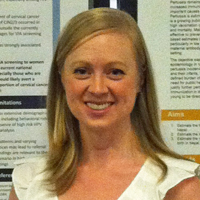HPM student wins best-poster prize at Consortium of Universities for Global Health
June 10, 2014
Racquel Kelly Kohler, doctoral candidate in health policy and management at UNC Gillings School of Global Public Health, won The Lancet and Consortium of Universities for Global Health award for best student poster at the consortium’s 2014 conference May 10-12 in Washington, D.C.
In a study of cervical cancer risk among Malawian women, Kohler found that high-grade dysplasia and cervical cancer were very common among the sample of Malawian women, especially among those who were HIV-positive.
Cervical cancer is the most common cancer and a leading cause of death among women in Malawi. The small country in sub-Saharan Africa implemented a visual inspection with acetic acid screening (VIA) campaign in 2004 to detect precancerous lesions among women ages 30 to 45 years. However, a Ministry of Health report indicated that many women diagnosed with cervical cancer are outside the recommended screening age range.
Using Kamuzu Central Hospital pathology data, Kohler and colleagues found that more than one-third of cancer cases diagnosed at the hospital occurred among women not within the recommended age range for screening. In addition, HIV infection was associated strongly with high-grade dysplasia and cervical cancer.
The study results suggest that current VIA screening guidelines may be missing women at risk of developing cervical cancer. An expansion of VIA screening to include women not covered by current guidelines, especially those who are HIV-positive, likely would avert a substantial number of cervical cancer cases in Malawi.
Other co-authors of the study include Jennifer Tang, MD, MSCR, Satish Gopal, MD, MPH, Mina Hosseinipour, MD, and N. George Liomba, MBBS, FRCPath, of UNC Project Malawi, and Grace Chiudzu of Kamuzu Central Hospital Department of Gynecology.
Ms. Kohler is a predoctoral fellow currently living in Lilongwe, Malawi, researching breast and cervical cancer at the UNC Project. Ms. Kohler’s research is supported by the UJMT Fogarty Global Health Fellows Program and the Gillings School’s Cancer Care and Quality Training Program.

